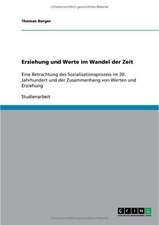Sakaki, A: Reluctant Warriors
Autor Kerstin Lukneren Limba Engleză Paperback – 25 noi 2019
Preț: 366.03 lei
Nou
Puncte Express: 549
Preț estimativ în valută:
70.06€ • 73.02$ • 58.32£
70.06€ • 73.02$ • 58.32£
Carte tipărită la comandă
Livrare economică 06-20 ianuarie 25
Preluare comenzi: 021 569.72.76
Specificații
ISBN-13: 9780815737360
ISBN-10: 081573736X
Pagini: 296
Ilustrații: Illustrations, unspecified; Tables
Dimensiuni: 152 x 229 x 18 mm
Greutate: 0.41 kg
Editura: Brookings Institution Press
ISBN-10: 081573736X
Pagini: 296
Ilustrații: Illustrations, unspecified; Tables
Dimensiuni: 152 x 229 x 18 mm
Greutate: 0.41 kg
Editura: Brookings Institution Press
Notă biografică
"
Alexandra Sakaki is a senior associate in the Asia division at the German Institute for International and Security Affairs (SWP) in Berlin.
Hanns W. Maull is senior distinguished fellow at the German Institute for International and Security Affairs, senior policy fellow at the Mercator Institute for China Studies, and adjunct professor of international relations and strategic studies at the Johns Hopkins University SAIS Bologna Center.
Kerstin Lukner is managing director of the Alliance on Research on East Asia (AREA) Ruhr, a joint program of the Universities of Bochum and Duisburg-Essen, Germany.
Ellis S. Krauss is professor emeritus of the School of Global Policyand Strategy at the University of California, San Diego.
Thomas U. Berger is a professor at the Frederick S. Pardee School of Global Studies, Boston University.
"Hanns W. Maull is senior distinguished fellow at the German Institute for International and Security Affairs, senior policy fellow at the Mercator Institute for China Studies, and adjunct professor of international relations and strategic studies at the Johns Hopkins University SAIS Bologna Center.
Kerstin Lukner is managing director of the Alliance on Research on East Asia (AREA) Ruhr, a joint program of the Universities of Bochum and Duisburg-Essen, Germany.
Ellis S. Krauss is professor emeritus of the School of Global Policyand Strategy at the University of California, San Diego.
Thomas U. Berger is a professor at the Frederick S. Pardee School of Global Studies, Boston University.
Cuprins
Contents:
Acknowledgments
1. Introduction: Germany, Japan, and the International Security Order
2. The Cold War Era: Geostrategic Environment and Domestic Politics
3. The Post-Cold War Era: Geostrategic Environment and Domestic Politics
4. Intervention Decisions: Contested Legitimacy
5. Arms Export Policies: Fragile Legitimacy
6. Conclusion: Still Reluctant Warriors?
Appendix: German and Japanese Military Missions 1990 to 2019
Notes
Index
Acknowledgments
1. Introduction: Germany, Japan, and the International Security Order
2. The Cold War Era: Geostrategic Environment and Domestic Politics
3. The Post-Cold War Era: Geostrategic Environment and Domestic Politics
4. Intervention Decisions: Contested Legitimacy
5. Arms Export Policies: Fragile Legitimacy
6. Conclusion: Still Reluctant Warriors?
Appendix: German and Japanese Military Missions 1990 to 2019
Notes
Index
Descriere
A team of noted international experts critically examines how and why Germany and Japan have modified their military postures since 1990, and assesses how far the countries still have to go - and why. The contributors also highlight the risks the United States takes if it makes too simplistic a demand for the two countries to "do more".

















